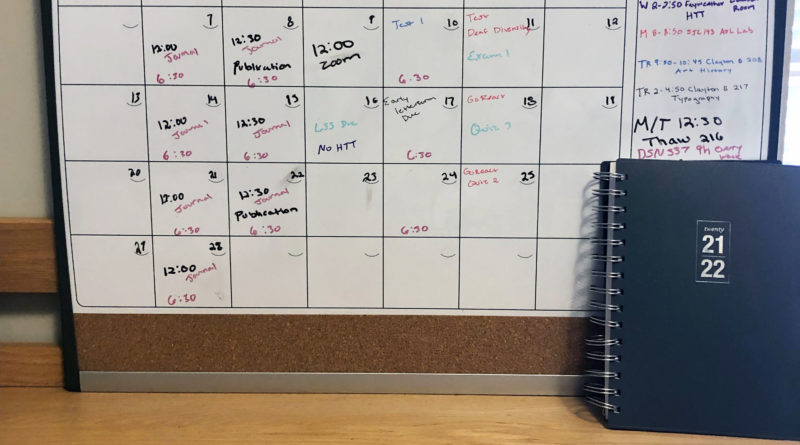Tips for time management told by a busy college student
Balancing being a full-time student, collegiate athlete and having a job can be quite stressful at times, but I’ve figured out some tricks to help me out when things get too hectic. Now I’d like to share what I’ve learned about time management with those who may be struggling.
One of the biggest problems students have is procrastination. According to the procrastination resource website Solving Procrastination, students waste 47% of their time procrastinating instead of getting things done. There are six tips I’ve found that can help students stave off the urge to procrastinate and almost trick themselves into being productive and getting things done.
Tip 1: Write it down.
Write everything that is due or that needs to be done in some form. Whether in a planner, on a whiteboard or simply making a to-do list, seeing everything that you need to do can help you to better plan out your time.
I use a whiteboard to write down all the assignments I have due for the next month. This allows me to visually see what it is I have to get done and erase the things I’ve already turned in. There’s something cathartic about being able to erase, mark through or check off a box after finishing a long assignment.
Tip 2: Prioritize.
There is no point working on something that isn’t due for a few weeks over something that is due the next day. Prioritize your time on tasks that are due soon to avoid the stress of built-up assignments all due at one time. I do this by writing out the things I need to get done for the day in order of most important to least important. This helps me to keep track of the progress I’ve made throughout the day and make sure I know what assignments I need to complete before others.
Tip 3: Tackle small assignments first.
It’s easy to look at a small assignment and want to put it off. You think it won’t take me that long to finish and eventually it goes from one task to three or four that you’ve put off. Then it’s five or six, and suddenly all those small assignments have melded to become one big problem. If an assignment shouldn’t take you long, go ahead and knock it out so you don’t have to worry about it later.
Tip 4: Know what you enjoy working on, and use it to your advantage.
Homework is rarely enjoyable. If you have the assignments you actually enjoy, save them as the last thing you do. Treat it almost like a reward for getting through all the difficult, time-consuming and boring assignments you’ve done. If you can power through the things you don’t actually want to do or don’t enjoy, you then get to relax and unwind with a subject you like.
On the flip side of that, maybe you’ve had a rough day and need to unwind before you tackle the endless amounts of homework assigned. In that case, tackle the more enjoyable tasks first. Success feeds off of success. By finishing some of your workload, you are setting yourself up to continue the pattern and complete the rest of the work you need to get done that day.
Tip 5: Don’t put things off—do them in parts.
The most important part of time management is not putting things off. It’s easy to look at school, work or even a workout for a sport and just not want to do it. Getting even a little bit of something done is better than nothing at all. You don’t have to tackle big projects all at once. Break the big tasks into smaller more manageable chunks and just get some of it done. Don’t wait until the last minute to get things done. Do what you can while you can and don’t put it off.
Tip 6: Do what works for you.
One thing to consider after taking these tips into consideration is that not all of these strategies are going to work for everyone. These tricks are what I do to manage my time wisely, but that doesn’t mean that each one of them is going to work for everyone. The best advice anyone can give is to find what works for you. Take the advice from someone else and find a way to apply it for yourself.
Don’t forget to work in time for fun and hanging out with the people you care about. School is important and staying on top of assignments is important, but it is not the be-all-end-all. You are not defined by your grades or how well you do in a particular class. Take the time to care for yourself and do the things you enjoy. You only go to college once—enjoy it.


The tips you have listed are sound and it would prove well to add them to ones repertoire. As a working adult, getting back into the swing of college study presents it challenges. I am sure to use the tips mentioned toward maintaining the family, work, and school life balance.